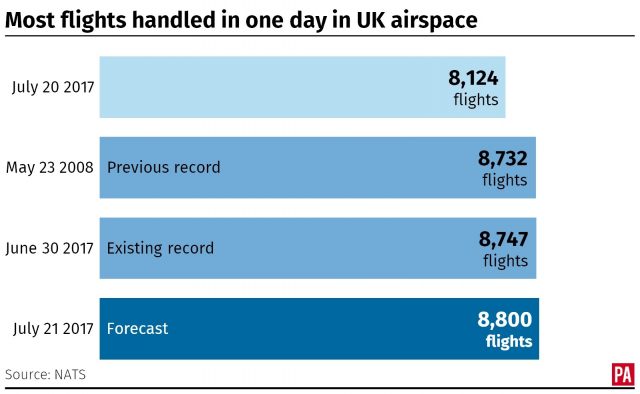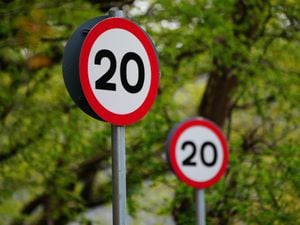UK air traffic controllers handling record 8,800 flights in 24 hours
A total of 8,800 planes are to be handled by controllers across the country over 24 hours.

Air traffic controllers are dealing with the busiest day in UK aviation history.
A total of 8,800 planes are to be handled by controllers across the country over 24 hours, at the start of a summer season which is due to see a record 770,000 flights in UK airspace – 40,000 more than last year.
The chief executive of the National Air Traffic Service, Martin Rolfe, warned that Britain’s air routes are “exceptionally crowded” and numbers of flights are reaching the limit of what can be accommodated.
The record day came as the Government launched its proposed aviation strategy for the years to 2050, in which ministers say they are “minded to be supportive” of airports that want to make “better use” of existing capacity.
Mr Rolfe said the busy day at airports has not taken controllers by surprise.
“We start more than a year in advance planning where the aircraft are going to be, looking at the schedules, working with the airlines and working with air traffic controllers to make sure we have a plan we can execute safely,” he told BBC Radio 4’s Today programme.
“We are approaching the limit of what the skies can handle with the airspace we have in place. The routes we currently have in place are becoming exceptionally crowded, and on the busiest days we sometimes have to reroute aircraft to make sure we can get everybody to their destinations on time.”
Mr Rolfe said the Government has consulted over the past couple of years on how to handle Britain’s future airspace needs, taking into account issues like noise, capacity and fuel use.
“We will take that stable guidance when it comes out and use that to change the airspace and modernise it for the next century,” he said. “The whole process takes a long time – probably two or three years – because we consult with local communities, so millions and millions of people will have a say in aircraft flying over their house.
“Local communities are very obviously concerned about what more traffic might look like, but actually modernising it means we can keep aircraft higher for longer and have them descend more steeply than they currently do, because modern aircraft are more capable than the aircraft that were in service when this airspace was originally designed. These routes were designed for old aircraft – we can use the new ones.”
Proposals included in the Government’s aviation strategy include doorstep luggage collection services and town centre check-in desks for passengers flying from British airports.
The scheme – already in use in Hong Kong and Japan – would allow travellers to have bags collected from their homes or to drop their bags at a depot in advance and pick up boarding cards before making their own way to the airport, making life easier for disabled passengers and saving space on commuter trains currently taken up by luggage.
Also under consideration are extra measures to deal with the terror threat, including funding for better airport security in foreign countries that have weaker systems. The Government also raised the prospect of reforming Air Passenger Duty to improve the competitiveness of British airports.
Transport Secretary Chris Grayling said: “Our new aviation strategy will look beyond the new runway at Heathrow and sets out a comprehensive long-term plan for UK aviation. It will support jobs and economic growth across the whole of the UK.”
It comes as a £1 billion programme to double the size of Manchester Airport’s Terminal 2 was launched.
The investment was described by the chief executive of Manchester Airports Group, Charlie Cornish, as “a significant moment” which demonstrated “the confidence that we have in the long-term future of both the North and the UK economy”.





